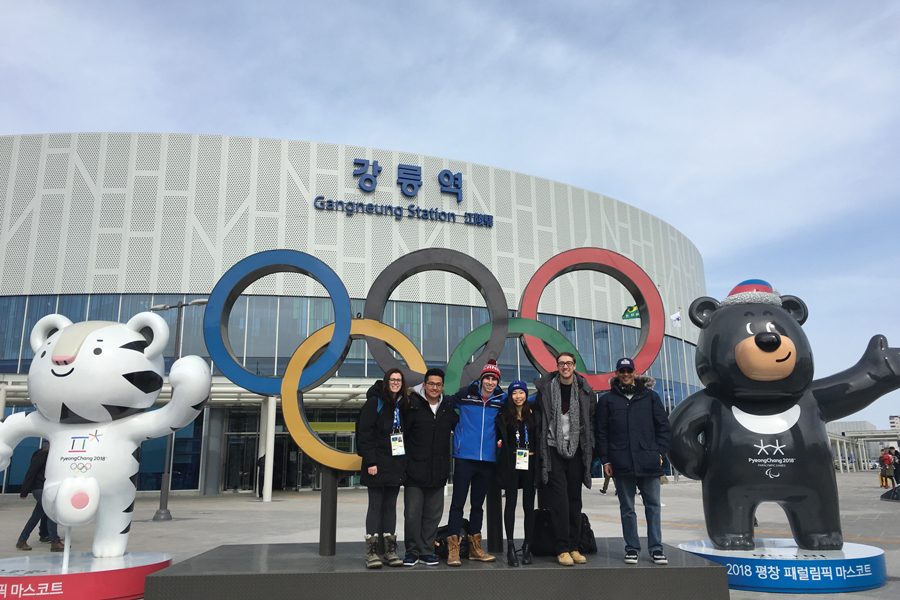Medill students travel to Pyeongchang for Winter Olympics coverage
Medill Prof. J.A. Adande and five graduate students pose in front of Olympic rings in South Korea. The group encountered several factors that impacted their reporting during the Winter Olympics, including media access and geopolitical tensions.
February 26, 2018
A group of Medill students tested their sports and international reporting skills earlier this month at the Winter Olympics in South Korea.
Medill Prof. J.A. Adande and five graduate students traveled to Pyeongchang from Feb. 9 to 18 to cover the sporting event as part of Medill Explores, a weeklong suspension of classes that gives students practical experience in journalism. Other students worked on the games from Pyeongchang and the U.S. through internships unaffiliated with the program.
The group worked mainly as freelance journalists, choosing what stories to write and submitting them to media outlets for possible publication. Though the Olympics attract many sports journalists from around the world, stories aren’t restricted to an athlete’s performance.
“The Olympics isn’t just about sports, it’s really an international event,” said Anna Kook, a Medill graduate student who was part of the group in Pyeongchang.
The 2018 games were overshadowed at times by geopolitical tensions between North Korea and the U.S. Though North and South Korea marched in the opening ceremony under a unified flag and competed for the first time as a unified women’s hockey team, the future of the nations’ diplomatic relations remains uncertain.
Kook said her interest in international politics helped her contextualize stories with historical and political implications in mind. For example, she highlighted the geopolitical significance behind a women’s hockey game between the unified Korea and Japan in a preview published by USA Today. Fluent in Korean and the only journalist of the group without a specialization in sports, Kook said she brought a different perspective to reporting.
Adande echoed Kook, noting that journalists choose a variety of topics to write about, including politics. The games’ location and relations between countries, he added, “all comes into play.”
“Sometimes it’s about relationships … sometimes it is about the politics,” he said. “(The Olympics) are meant to be apolitical, but it’s hard to avoid.”
Several other factors impact a reporter’s coverage, including what Medill graduate student Aaron Rose called the “hierarchical” structure of media access.
NBC holds broadcast rights to the Olympics through the 2032 games, granting them priority access to interviews with athletes. Rose said he didn’t have the same access as broadcasters with a “standard journalist” credential.
“NBC gets access like no others because they pay the big bucks,” he said.
Nevertheless, Rose said the games provide a special opportunity for journalists, as Olympic athletes don’t “get the most notoriety” because they compete less frequently in well-publicized events than others. This makes their stories unique, he said, and gives journalists a better chance to speak with families.
But Rose’s “viral” story wasn’t about a competing Olympic athlete.
Rose profiled Laurent Duvernay-Tardif, a Canadian-born offensive lineman for the Kansas City Chiefs and reporter at the Olympics, for a story published in The Kansas City Star. In the story, Rose, a Canadian citizen who received a credential by working for the Canadian Broadcasting Corporation, broke the news that Duvernay-Tardif planned to put “M.D.” on his Chiefs jersey once he becomes a physician.
Adande said he “couldn’t be happier with the way the trip went” because students proved their reporting talent.
“They rose to the occasion,” he said. “It was challenging. I think they grew (and) I think they, most importantly, proved something to themselves that they were up to the task.”
Email: [email protected]
Twitter: @_perezalan_


